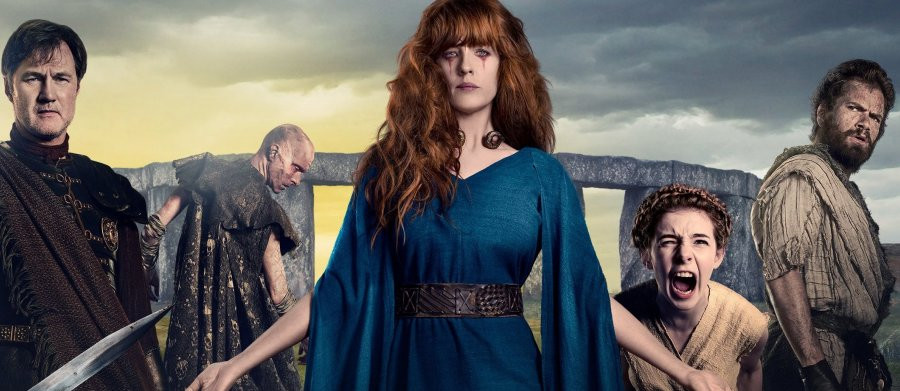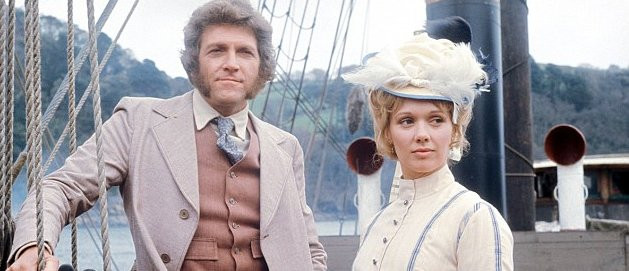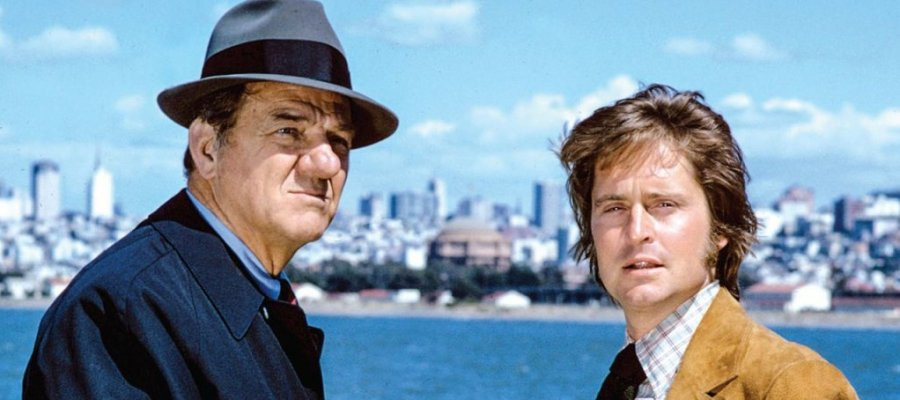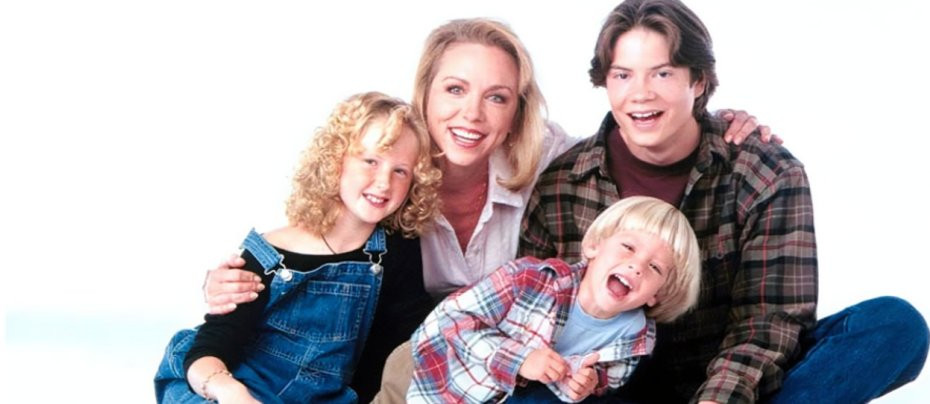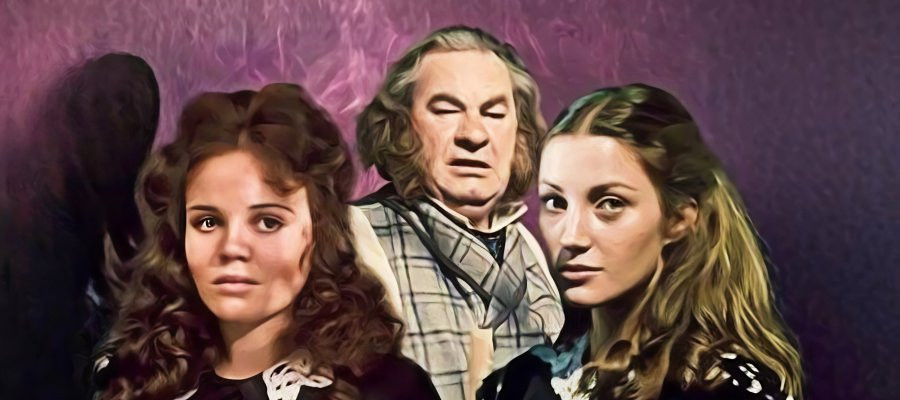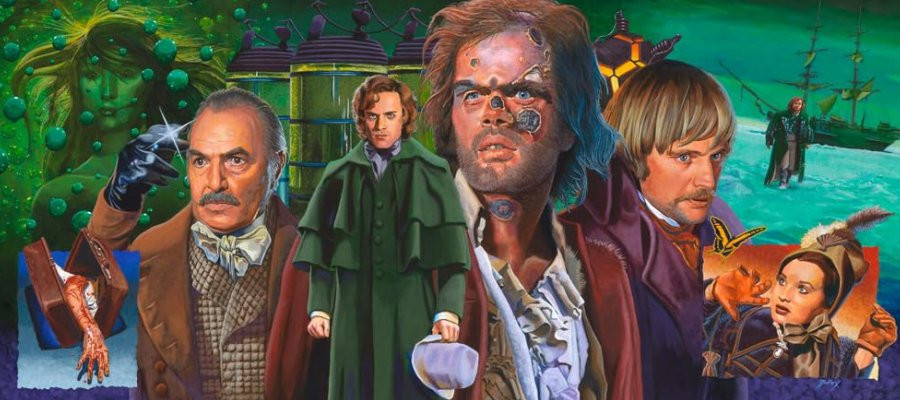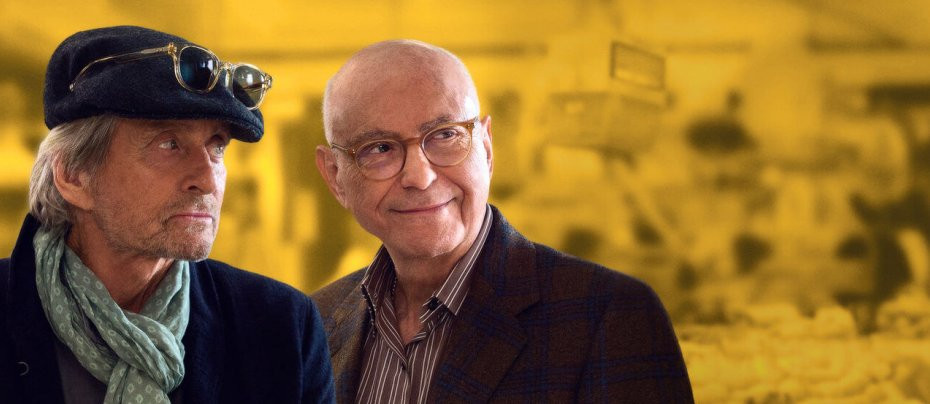
The Kominsky Method
2018 - United StatesWhile fashionable "stand up comedy" now seems obsessed with youth, much of the greatest "situation comedy" has been written by, for, and about older people. In this context, The Kominsky Method is an interesting hybrid. It is about getting old in the most youth obsessed place in the world, Hollywood (actually West Los Angeles, of which Hollywood is geographically a part: in fact, very few Hollywood people in the cultural sense now live or work in Hollywood itself in the geographical sense, which is a rather run down district).
Sandy Kominsky is a septuagenarian acting coach. A serious stage actor in New York with a Tony Award to his name, he moved to LA in the 1960s only to find that his seriousness did not endear him to casting directors. We see how his insisting on researching his role even for an advertisement causes problems. Unable to earn his living from his considerable acting skills, he teaches them instead. He owns his own studio and is highly respected as a mentor.
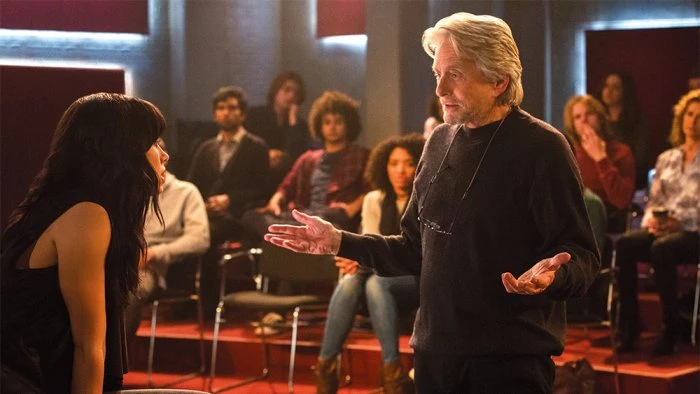
The dichotomy of the show is reflected in Sandy's character. In his acting studio, he is the wise old 'sensei,' a very impressive figure. We see him as a true master of his craft, both as actor and teacher. This is based in turn on a deep understanding of human nature. His lessons sometimes turn into psychotherapy. Some of the things he says are genuinely insightful. He cares deeply for his students. He feels guilty taking their money when he sees how poor some of them are. Against his own commercial interests, he tells them the brutal truth about acting as a career.

Outside the studio, however, he seems immature in every other aspect of his life. Like many in Hollywood, he has never really grown up. He affects a trendy scruffy, unshaven look that actually makes him look even more of an old man. He gets emotional under pressure. Thrice divorced, and by his own admission a bad husband, he dates much younger women. He indulges in illegal narcotics - while at the same time trying to deal with serious threats to his health which, he believes, require a formidable array of prescription medicines: the combination must leave him a chemical mess. He neglects his financial affairs. While nominally assuming the standard Hollywood left of centre politics, he is grossly negligent in paying his taxes.
He might be a rather unappealing character if he was not played with considerable charm by Michael Douglas - looking and sounding more than ever like his father, Kirk. Any disbelief that a not particularly well preserved senior citizen would be able to attract good looking younger women is negated by the knowledge that Douglas is married to Catherine Zeta-Jones in real life.
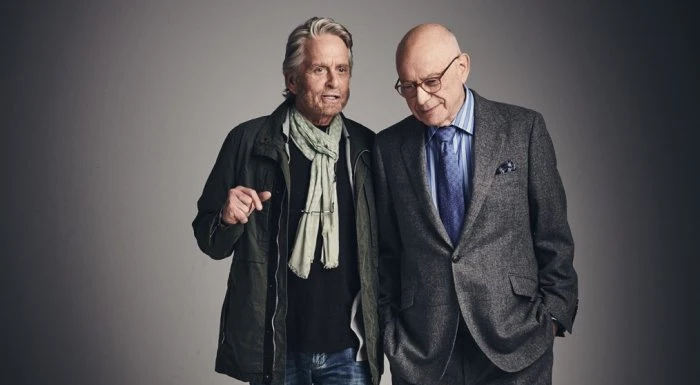
He is given additional appeal by being part of a wonderful double act with his agent and oldest friend, Norman Newlander, played by Alan Arkin at his most Alan Arkin. Their scenes together are a joy. One cannot help thinking of Jack Lemmon and Walter Matthau as they trade one-liners. Like many close friends they express their friendship through the exchange of insults that would be unforgivable under any other circumstances.

Although The Kominsky Method is primarily a vehicle for Douglas, there is no doubt that Arkin steals the show. Norman is a fussy old man, but we gradually see that he is also a very successful, powerful, and wealthy Hollywood player: the two aspects of the same character are by no means incompatible. While we see him mainly from the sympathetic point of view of his old friend, Sandy, there are hints that Norman has been, and perhaps still is, a ruthless operator. In many respects, he is Sandy's direct opposite, a thoroughly practical man totally at home in his environment.
There is no denying that the show lost its way after Arkin left at the end of the second season. It is unclear why he did. The official line is that the show was never intended to last long and he only committed to two seasons. If so, it is still surprising that he could not be persuaded to stay longer. He seems to have an easy onscreen chemistry with Douglas and, if his age and health were factors, there is no sign of that in his performance.
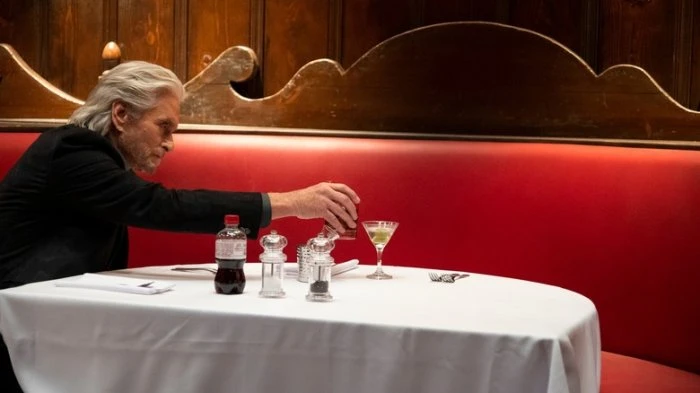
As a result of his departure the third season is by far the weakest. Indeed, the first episode of that final season is padded with a lot of flashbacks of Norman, who is also referenced frequently in the script in later episodes. While this is a pleasant acknowledgement of both the character and the actor, it also draws attention to the giant Norman-shaped hole in what remains. The whole tone and style of the comedy changes. Neil Simon-esque witty exchanges give way to farce - present in the earlier seasons but not to excess. The increased farce requires that several supporting characters who were previously treated with some sympathy and dignity are required to become increasingly absurd. This does indeed generate some laughs, and the ending has an emotional punch, but at the price of what made the show so different.
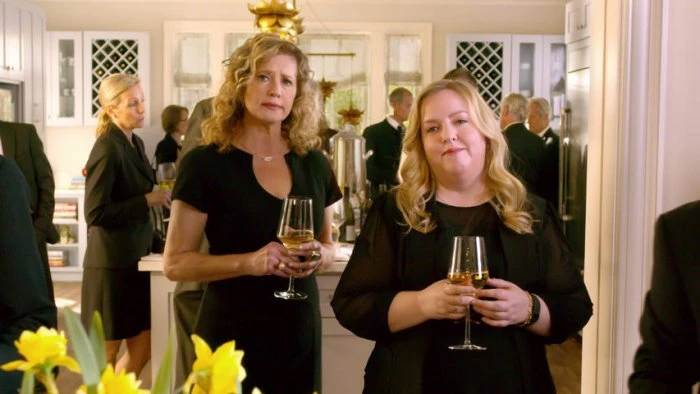
This is doubly regrettable because the supporting cast and characters are worthy of a show in which the two principals are Oscar winners. Nancy Travis (So I Married an Axe Murderer) is Sandy's love interest in the first two seasons, while Jane Seymour, honestly getting even more beautiful with age, is Norman's rather unlikely love interest in the second. Lisa Edelstein (House) balances poignancy and brittle humour quite brilliantly, at least in the first two seasons, as Norman's wayward daughter, Phoebe. Sarah Baker provides much of the emotional heart of the show as Sandy's more down to Earth daughter, Mindy.

If Mindy has a vulnerability, it may be an Electra Complex: her boyfriend, Martin, played by Paul Reiser, is much closer to her father's age and has much in common with him. Indeed, the two men enjoy each other's company to the extent that Mindy sometimes feels a bit left out - not least because the more self-confident and successful Sandy is the man the socially insecure Martin would secretly like to be. Sandy seems to appreciate this hero worship and indulges Martin more, perhaps, than he should. There is an interesting comparison to be made between Sandy's friendships with Norman and Martin: with Norman, Sandy is definitely the junior partner, but with Martin he enjoys being the one to whom the other looks up.
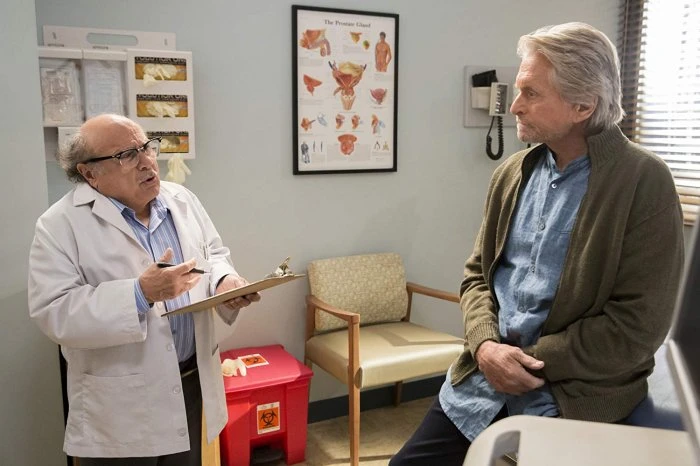
The best thing about the supporting casting is how Douglas brings in his old pals. His Romancing the Stone co-stars Danny DeVito and Kathleen Turner turn up in guest slots in the earlier seasons, with Turner joining the regular cast in the third season as Sandy's first (ex) wife and Mindy's mother. Her powerful story arc is by far the best thing in the final season.

Haley Joel Osment, apparently a Douglas golfing buddy in real life, does some of his best work as an adult actor as Norman's Scientologist grandson - a compulsive salesman whose engaging smile never quite reaches the eyes that remain fixed on his victim. Osment's sister, Emily, plays one of Sandy's students: they are a fairly generic bunch, but they have their moments, especially Melissa Tang as a shy girl who reveals her latent powers in a stunning monologue.
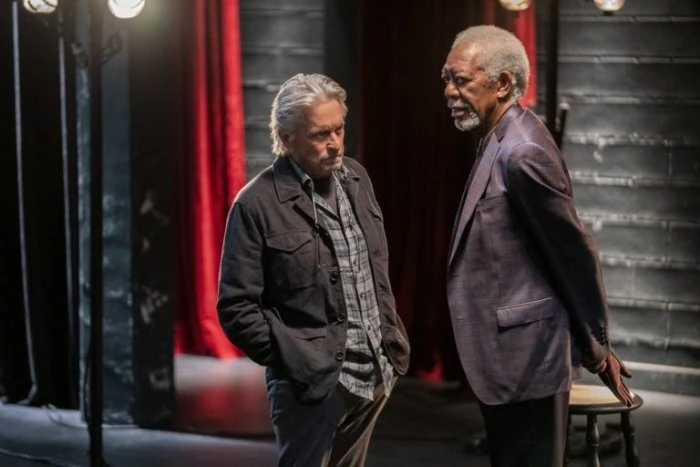
As might be expected, given its location, subject matter, and A-List connections, the show attracted a strong cast of guest stars, some, including Morgan Freeman, Allison Janney, and Barry Levinson, playing themselves. It has to be said that Douglas was sometimes too deferential towards them. The best were those - above all Elliot Gould - who were not afraid to have fun at their own expense.
From a British point of view, and perhaps even a non-Hollywood American perspective, one of the most interesting things about The Kominsky Method is how it demonstrates a different cultural attitude to getting older. In British comedy, age has usually been a cue for wistful reflection. In West LA it is something to be fought actively.
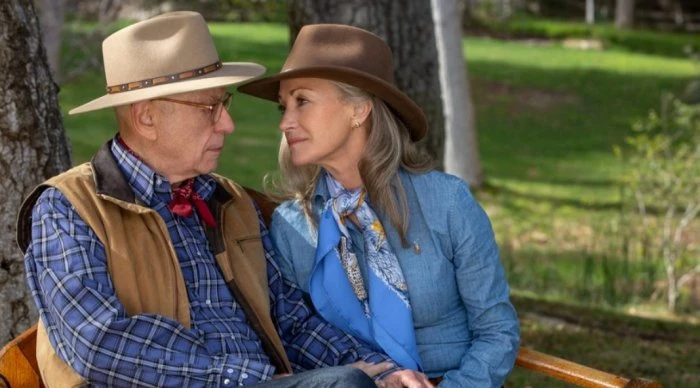
Retirement does not come as easily to Americans as to Britons. It is quite normal for Americans, especially high fliers, to carry on working full time beyond their sixties. This may be due to welfare provision, or the lack thereof, but there is also a definite work ethic aspect in many cases where money is not the main issue. Also, as Norman points out in his tactless fashion, there is a definite correlation between giving up work altogether and premature death.
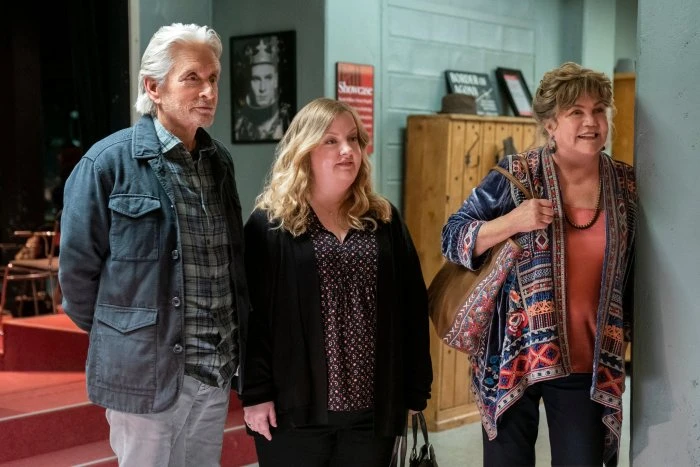
This leads on to another cultural difference: Americans take their health far more seriously, possibly because they must take responsibility for it personally. They see themselves not so much as patients as consumers in a medical marketplace. In The Kominsky Method, characters discuss medications like any other consumer product, and recommend individual medical specialists as they would a mechanic or a builder. There is no mention of waiting lists. However, it should be noted that West LA should not be taken as typical of the American healthcare system: if it has more top medical practitioners per square mile than almost anywhere in the world that is because it also has one of the greatest concentrations of wealthy hypochondriacs in the world.
It is perhaps a surprise that The Kominsky Method was conceived by Chuck Lorre, who is also responsible for the likes of Dharma and Greg, Two and A Half Men, and The Big Bang Theory. It is a more thoughtful piece of work, even if one can also see much of the same sort of humour. In many ways it seems more like Roseanne, on which Lorre also served as writer, in that it sometimes uses comedy to touch on some serious issues. The big difference is that it is not studio bound. Nor is there a laugh track. The style is more like that of a drama, except with some very amusing dialogue, or perhaps an upmarket 1970s feature film comedy. This is a good thing, except that there is sometimes an inconsistency of tone, especially when Lorre seems to lose his nerve and fall back on his familiar studio comedy tricks. Most of the time, however, it is something that is increasingly rare these days - a proper grown up comedy for and about mostly grown up people.
Review: John Winterson Richards
John Winterson Richards is the author of the 'Xenophobe's Guide to the Welsh' and the 'Bluffer's Guide to Small Business,' both of which have been reprinted more than twenty times in English and translated into several other languages. He was editor of the latest Bluffer's Guide to Management and, as a freelance writer, has had over 500 commissioned articles published.
He is also the author of ‘How to Build Your Own Pyramid: A Practical Guide to Organisational Structures' and co-author of 'The Context of Christ: the History and Politics of Rome and Judea, 100 BC - 33 AD,' as well as the author of several novels under the name Charles Cromwell, all of which can be downloaded from Amazon. John has also written over 100 reviews for Television Heaven.
John's Website can be found here: John Winterson Richards
Seen this show? How do you rate it?
Seen this show? How do you rate it?
Published on November 17th, 2021. Written by John Winterson Richards for Television Heaven.


